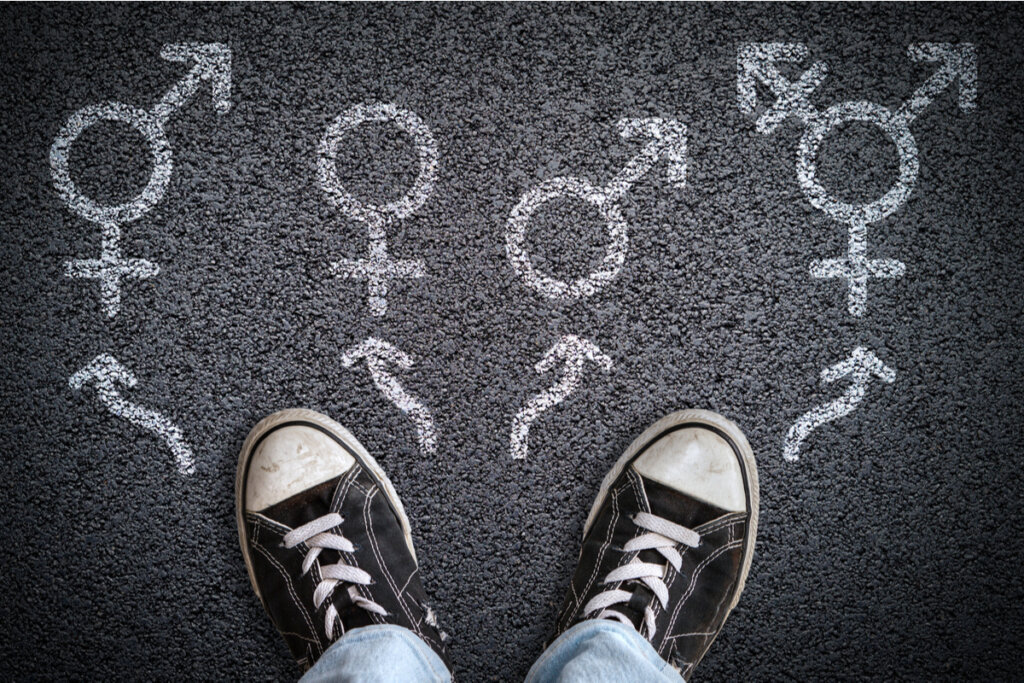What are the differences between sex and gender? As a matter of fact, while sex is a biological and objective concept, gender is a far more subjective psychosocial construction.
In this article, we’ll explain each of these concepts. In addition, we’ll talk about the differences between them.
Sex and gender
Sex has different definitions. It’s defined as ‘the organic condition, male or female, of animals and plants’, ‘the sexual organs’ and ‘the set of beings belonging to the same sex’ (male and female). It encompasses a set of genetically defined physical and biological characteristics that determine whether a living being is male, female, or intersex.
On the other hand, gender is the ‘group to which human beings of each sex belong, understood from a sociocultural rather than exclusively biological point of view’. In other words, it has nothing to do with the genetic luck of the individual, but with the cultural ideas associated with it.
Thus, broadly speaking, we can say that sex is the biological condition of an individual while gender is a psychosocial construction of what a person of a certain sex is expected to do. It encompasses attitudes, roles, behaviors, etc.
Gender includes socially constructed roles, behaviors, and attributes that are considered ‘appropriate’ for an individual, based on their biological sex. For example, being sensitive if you’re a woman, or not crying in public if you’re a man.
The differences between sex and gender
Without further ado, we’ll now discuss the differences between sex and gender. Maybe you can think of some more?
1. Social construction vs. biology
As we said earlier, one of the main differences between sex and gender concerns the concept itself. Sex encompasses biologically developed elements, and is unable to be altered. However, gender is a social construction that can be modified, and where our ideas and expectations intervene.
2. Sex is biological and gender is cultural
Linked to the previous point, another difference between sex and gender is the following: sex is a ‘label’ that responds to biological characteristics such as sexual organs, hormones, and chromosome endowment. Gender responds to something cultural, to a psychosocial construction (and not to biology).
3. Gender is symbolic, sex isn’t
Gender is symbolic. It’s given by our sexual characteristics. Gender is a social construction, so it’s a symbolic concept.
The gender label refers to how society as a whole determines what’s masculine and what’s feminine. Thus, society grants us specific roles and expected behaviors according to our sex.
4. Sex determines the reproductive role
The reproductive function of men and women is different. This doesn’t depend on their gender, but their sex. Therefore, sex involves a different reproductive role in each person. This doesn’t happen with gender. It can cause us to experience our roles differently but not to change them.
5. Continuous vs. Categorical
Gender is mediated by culture. This means that we can see how ‘masculinity’ and ‘femininity’ differ from person to person. It depends a great deal on the experiences and opinions of different individuals. That’s why gender is situated on a continuum.
In contrast, sex isn’t situated on a continuum, but is categorical. Although it can appear in unusual ways, to define it, there exists a series of criteria that allow it to be assessed as masculine or feminine. They’re mainly linked to the reproductive organs (gonads), the genitals, and the chromosomes.
6. Sex is objective, gender is subjective
Since sex is defined by objective (and measurable) biological characteristics, we say that it’s an objective concept. On the other hand, gender, since it doesn’t respond to objective biological characteristics, is far more difficult to measure. Therefore, it’s a more subjective concept.
7. Gender is exclusive to the human being
Another of the differences between sex and gender concerns the fact that gender is exclusive to human beings, while sex is typical of any living being. Consequently, in nature, the distinction between the sexes is common to all living beings that sexually reproduce.
Gender is born from an abstract interpretation of these sexes. This interpretation can only be applied to the human being. To understand it better; a cat can be male or female, but the concepts of male or female gender can’t be applied to it.
8. Gender is typical of animals with abstract thought
Sex is identified or localized in plants and fish (in addition to animals). However, gender can only be identified in animals with a high capacity for abstract thought. The highest representative of these animals is the human being.
It’s due to the fact that gender is largely a social construct. To develop this type of construction, certain semantics and symbol systems are required regarding what it means to ‘be’ masculine or feminine.

9. Sex is static
Sex is static, in the sense that it depends on objectifiable elements that, naturally, don’t change, while gender is a construction, an ‘in motion’ dynamic. Furthermore, gender can be ‘negotiated’ in interactions and other actions.
10. Gender can be based on stereotypes
Gender, being a social construct, is often based on stereotypes. In reality, gender roles are frequently created based on the social stereotypes of what’s believed to be more related to men or women.
Instead, sex is objective and isn’t based on stereotypes, but on biology. It’s as a result of the stereotypes associated with sex that specific gender roles arise.
11. There are diseases associated with sex, but not with gender
A woman can suffer from pyometra, but not prostate cancer. In other words, organs specific to the male or female will suffer specific ailments. This isn’t the case with gender.
If there are diseases associated with gender, they’re not due to its nature, but because of social pressure in this regard. For example, people of non-binary gender are often at higher risk for mental illnesses such as depression or anxiety disorders. These stem from the violence and oppression they experience, not their gender, per se.
As you can see, there are notable differences between sex and gender. Although they’re related concepts, because one of them (sex) usually influences the other, they’re concepts that must be differentiated.
“Be who you want to be – be free in your own skin, be liberated and feel beautiful and do what you want to do without judgment.”
-Adam Lambert-
The post The Differences Between Sex and Gender appeared first on Exploring your mind.



















Comments